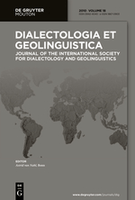
Dialectologia et Geolinguistica
Scope & Guideline
Advancing Knowledge in Dialects and Geolinguistics
Introduction
Aims and Scopes
- Dialectology and Geolinguistics:
The journal primarily investigates the geographical distribution of dialects and languages, exploring how regional variations contribute to our understanding of language as a dynamic system. - Sociolinguistic Perspectives:
It incorporates sociolinguistic approaches to examine how social factors, such as ethnicity, class, and community, affect language use and dialect formation. - Historical and Comparative Studies:
The journal features research that delves into the historical development of dialects, including synchronic and diachronic analyses, to understand language evolution over time. - Quantitative and Qualitative Methodologies:
Research published in the journal employs a range of methodologies, from quantitative analyses of linguistic data to qualitative case studies, providing a comprehensive view of dialectal phenomena. - Focus on Endangered Languages:
There is a significant emphasis on documenting and analyzing endangered languages, addressing their decline and the efforts needed for revitalization. - Cross-Cultural and Cross-Linguistic Studies:
The journal promotes comparative studies across different linguistic traditions, offering insights into the interactions between languages and cultures.
Trending and Emerging
- Endangered Languages and Revitalization:
There is a significant uptick in research addressing endangered languages, emphasizing the need for documentation and revitalization efforts in the face of global language decline. - Quantitative Analysis of Dialect Morphology:
Recent publications show a trend towards quantitative methodologies, particularly in analyzing dialect morphology, which allows for more robust data-driven insights into language variation. - Geographical and Cultural Variation Studies:
Emerging themes include a focus on geographical variation in language, particularly in relation to cultural practices and social structures, highlighting the interplay between geography and linguistics. - Digital Linguistics and Annotation Techniques:
The use of digital tools and innovative annotation techniques for linguistic data collection and analysis is on the rise, reflecting advancements in technology and its application in linguistic research. - Cross-Cultural Linguistic Comparisons:
There is an increasing interest in cross-cultural and cross-linguistic comparisons, which enhances the understanding of linguistic diversity and the interactions between different language communities.
Declining or Waning
- Historical Dialectology:
Research specifically focused on historical dialectology appears to be decreasing, as newer studies lean more towards contemporary dialect variation and the socio-linguistic aspects of language. - Pidgin and Creole Languages:
While previously a significant area of study, there has been a noticeable decline in publications addressing pidgin and creole languages, possibly due to shifting interests towards more widely spoken dialects. - Regional Press Studies:
Studies focused on regional press and its linguistic implications are less frequently published, suggesting a waning interest in this aspect of dialectology. - Topographic Naming Conventions:
Research on the designation and representation of topographic elements in dialects is becoming less prominent, indicating a possible shift towards more dynamic aspects of language use.
Similar Journals
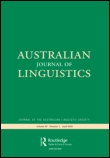
Australian Journal of Linguistics
Connecting Scholars to Language's Rich TapestryThe Australian Journal of Linguistics, published by Routledge Journals, Taylor & Francis Ltd, stands as a distinguished platform in the field of linguistics, fostering rigorous academic discourse since its inception in 1981. With an ISSN of 0726-8602 and an E-ISSN of 1469-2996, the journal has achieved a notable Q2 ranking in the linguistics and language category for 2023, indicating its quality and relevance within the academic community. With a Scopus ranking of #316 in Arts & Humanities and #373 in Social Sciences, it sits in the 71st and 68th percentiles respectively, underscoring its impact in the fields it encompasses. The journal aims to publish high-quality research articles that contribute to the understanding of linguistic theory, sociolinguistics, and applied linguistics, making it an essential resource for researchers, professionals, and students alike. The journal is based in the United Kingdom, at 2-4 Park Square, Milton Park, Abingdon OX14 4RN, Oxon, England, and actively encourages contributions that can expand the current linguistic discourse, reinforcing its commitment to highlighting diverse perspectives in language research.

REVUE DE LINGUISTIQUE ROMANE
Connecting Cultures Through Linguistic InsightsREVUE DE LINGUISTIQUE ROMANE, published by the esteemed SOCIÉTÉ LINGUISTIQUE ROMANE, is a prominent academic journal dedicated to the exploration of Romance linguistics. With its ISSN 0035-1458, the journal plays a significant role in advancing knowledge within the fields of linguistics and the history and philosophy of science. Although it does not currently offer Open Access, it provides critical insights and peer-reviewed research that are indispensable for scholars, educators, and students interested in the nuances of Romance languages. The journal, which has seen converged coverage from 2006 to 2017, and then again from 2019 to 2021, is ranked in the third quartile (Q3) across various categories within Scopus, reflecting its established presence in the academic community. As a vital resource for interdisciplinary studies, REVUE DE LINGUISTIQUE ROMANE is instrumental for those seeking to deepen their understanding of linguistic structures, cultural nuances, and the historical development of Romance languages.

Dialectologia
Illuminating the Nuances of Language VariationDialectologia, published by the Universidad de Barcelona, Facultad de Filología, is a distinguished academic journal dedicated to the fields of linguistics and language studies. Since its inception in 2008, this Open Access journal has made significant strides in disseminating knowledge, fostering scholarly communication, and promoting research in dialectology and sociolinguistics. With its current classification in the Q3 quartile of linguistics and language, and Scopus rankings placing it in the 32nd and 29th percentiles within the Arts and Humanities and Social Sciences, respectively, Dialectologia plays a crucial role in advancing the study of language variation and change. The journal’s commitment to providing a platform for innovative research is underscored by its accessibility to a wide audience, ensuring that researchers, professionals, and students alike can engage with and contribute to contemporary discourse in language studies. Based in Barcelona, Spain, Dialectologia not only enriches academic literature but also connects a global community of language scholars through its compelling and diverse contributions.
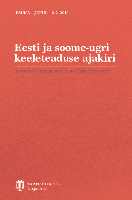
Eesti ja Soome-Ugri Keeleteaduse Ajakiri-Journal of Estonian and Finno-Ugric Linguistics
Fostering Insights into Estonian and Finno-Ugric HeritageEesti ja Soome-Ugri Keeleteaduse Ajakiri - Journal of Estonian and Finno-Ugric Linguistics is a premier academic journal published by UNIV TARTU PRESS, dedicated to advancing the field of linguistics with a particular focus on the Estonian and Finno-Ugric languages. Since its inception, the journal has embraced an Open Access publishing model, allowing researchers and enthusiasts to freely explore its groundbreaking studies and findings since 2013. With an Impact Factor that places it in the Q3 quartile of leading journals within the linguistic domain, it serves as a vital platform for the dissemination of new research and theoretical advancements. Ranked 410th out of 1088 journals in the Arts and Humanities category for Language and Linguistics, it reflects a robust commitment to quality scholarship that appeals to academics, professionals, and students alike. Operating from Tartu, Estonia, the journal aims to foster greater understanding and appreciation of the Estonian language within the broader context of Finno-Ugric studies, making it an essential resource for anyone interested in these unique linguistic cultures.
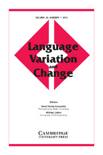
Language Variation and Change
Unraveling the Threads of Language EvolutionWelcome to Language Variation and Change, a prestigious journal published by Cambridge University Press and dedicated to the rigorous exploration of linguistic diversity and its evolution. With an ISSN of 0954-3945 and an E-ISSN of 1469-8021, this journal has been a pivotal platform for scholars since its inception in 1989, continuing to publish cutting-edge research up to 2024. Language Variation and Change is recognized in the top quartile for Linguistics and Language (Q1) and holds an impressive Q2 ranking in Education for 2023, underscoring its significant contribution to these fields. Its strong Scopus rankings—placing it in the 86th percentile for Arts and Humanities in Language and Linguistics—highlight its impact and quality. This journal aims to foster a deeper understanding of the dynamic interplay between language and society, making it essential reading for researchers, professionals, and students eager to engage with the latest findings and theoretical discussions in the arena of sociolinguistics. Stay connected with the evolving landscape of language studies through Language Variation and Change.
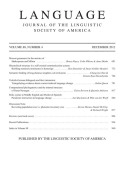
LANGUAGE
Connecting Scholars in the World of LanguageLANGUAGE, published by the Linguistic Society of America, is a premier academic journal dedicated to the rigorous study of linguistic theory and practice. With an ISSN of 0097-8507 and E-ISSN 1535-0665, this esteemed journal has established itself as a leading publication in the field of linguistics since its inception. The journal has consistently maintained a high impact factor, being ranked in the Q1 category in Linguistics and Language for 2023, placing it among the top tier of academic journals. Notably, it also holds impressive Scopus rankings, being positioned at #75 out of 1088 in Arts and Humanities, and #89 out of 1167 in Social Sciences, demonstrating a significant impact and reach in the discipline. While it is not an open-access journal, LANGUAGE provides crucial insights into linguistic research, fostering a vibrant academic community. Spanning years from 1996 to 2024, it continues to be an essential resource for researchers, professionals, and students alike, aiming to advance the understanding of language in its myriad forms and functions.
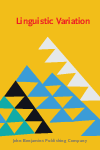
Linguistic Variation
Unveiling the Nuances of Language VariationLinguistic Variation is a prestigious academic journal dedicated to advancing the field of linguistics and language studies. Published by John Benjamins Publishing Co, this journal provides a comprehensive platform for researchers, educators, and students to explore the rich diversity of linguistic practices and theories. With an ISSN of 2211-6834 and an E-ISSN of 2211-6842, it spans a crucial timeline from 2017 to 2024. Renowned for its rigorous peer-review process, Linguistic Variation holds Q2 status in Linguistics and Language and Q3 in Food Science within the 2023 category quartiles, reflecting its significant role in interdisciplinary research. The journal ranks #412 out of 1088 in Arts and Humanities and #489 out of 1167 in Social Sciences according to Scopus, indicating its growing influence and esteem in the academic community. Researchers will appreciate its focus on empirical studies and theoretical advancements while benefiting from a wide array of access options that cater to varied readership needs. As a vital resource in linguistics, it aims to foster critical dialogue and innovation within the discipline.

Hrvatski Dijalektoloski Zbornik
Charting the Evolution of Language in CroatiaHrvatski Dijalektoloski Zbornik is an esteemed academic journal dedicated to the field of Dialectology and Linguistic Research, published by the Croatian Academy of Sciences and Arts, Department of Linguistic Research. With an Open Access policy established since 2015, the journal aims to promote the dissemination of research findings and encourage scholarly exchange among linguists and dialectologists. The journal has achieved recognition in the field, ranking in the Q3 category for Linguistics and Language in 2023, and its impact can be further gauged through its Scopus rankings, positioning it favorably within both the Arts and Humanities and Social Sciences categories. As it converged its publication years from 2017 to 2023, the journal continues to showcase rigorous research from various dialectical studies, contributing significantly to the understanding of language variation and evolution in Croatia and beyond. Researchers, professionals, and students alike are encouraged to explore the rich compendium of linguistic scholarship that this journal offers.
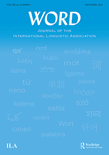
WORD-JOURNAL OF THE INTERNATIONAL LINGUISTIC ASSOCIATION
Championing high-quality research to inspire linguistic innovation.WORD-JOURNAL OF THE INTERNATIONAL LINGUISTIC ASSOCIATION is a leading peer-reviewed journal dedicated to advancing the field of linguistics and language studies. Published by Routledge Journals, Taylor & Francis Ltd, this esteemed journal has earned a reputation for its rigorous scholarship, reflected in its 2023 Q2 ranking in Linguistics and Language and its solid performance in Scopus Ranks. Encompassing a wide range of topics—from theoretical frameworks to empirical research—WORD serves as an essential resource for linguistics researchers, educators, and students alike. While currently not operating under an open access model, the journal is committed to providing high-quality, impactful research articles that contribute significantly to the linguistic community. With its convergence periods from 1998 to 2009 and 2015 to 2024, WORD continuously fosters the discourse of language studies, ensuring that critical insights and discussions are accessible for ongoing academic exploration.
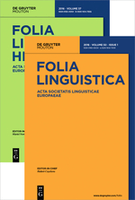
FOLIA LINGUISTICA
Pioneering Research at the Forefront of LinguisticsFOLIA LINGUISTICA, published by WALTER DE GRUYTER GMBH, is a premier scholarly journal dedicated to the field of linguistics. Established in 1967, the journal has consistently provided a platform for innovative research and scholarly discourse in language and linguistics, contributing significantly to the academic community's understanding of language structures, usage, and cognitive processes. With its classification in the top quartile (Q1) of linguistics and language in 2023, FOLIA LINGUISTICA holds a respectable rank (#282/1088) within the Arts and Humanities category and an admirable percentile rank of 74th, ensuring its position at the forefront of linguistic scholarship. Researchers and academics from around the globe can access a wealth of knowledge and cutting-edge research findings through this esteemed publication, which is vital for anyone looking to engage with the latest advancements in linguistics. Located in Berlin, Germany, FOLIA LINGUISTICA encompasses all aspects of language research, making it an indispensable resource for researchers, professionals, and students alike seeking to deepen their understanding of language and its complexities.